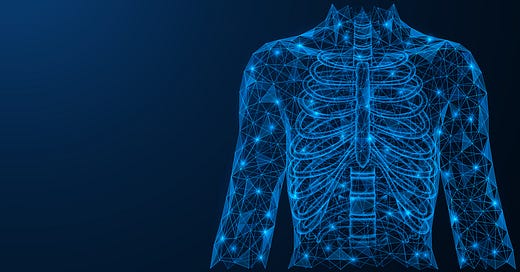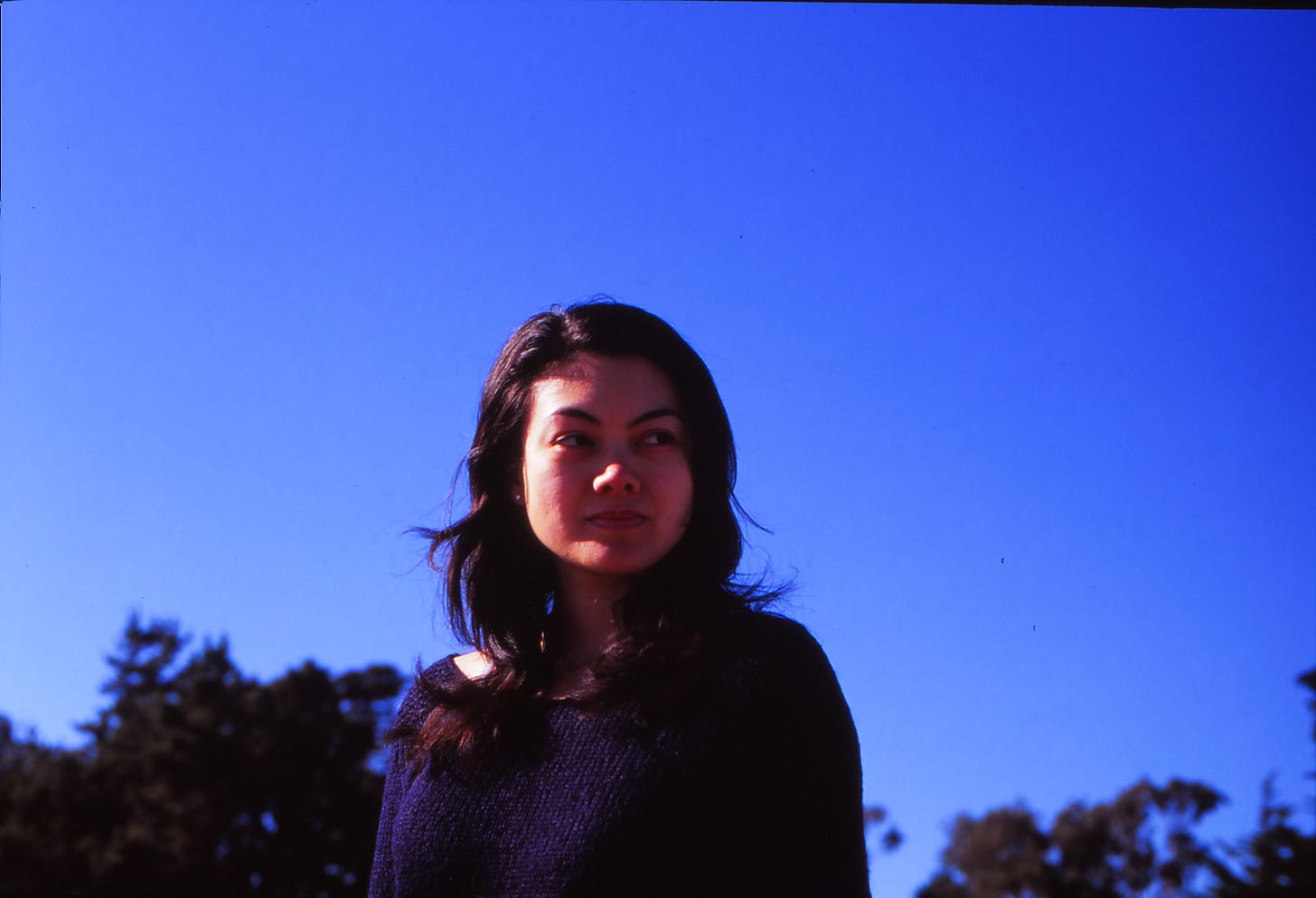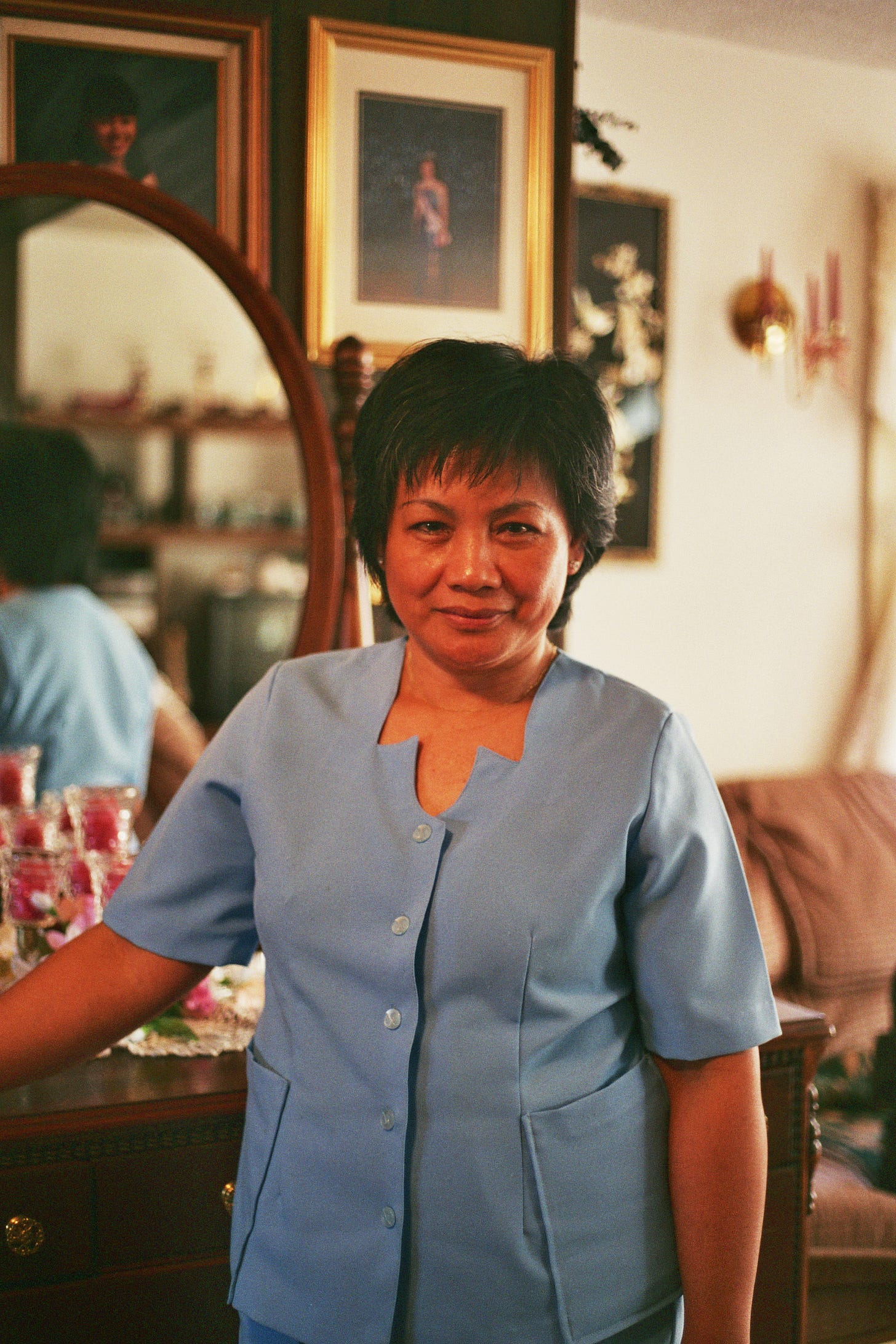Listen, and You Will Hear Pain Speak
In looking back on a marriage and years of physical agony, Liz Iverson decodes her own mind-body connection.
After he’s gone, I stay up all night searching for apartments, feeling liberated. The next night, I talk for hours to a long-distance friend. “Come visit me,” she says when I tell her how he smashed the kitchen chair, how it wasn’t the first time. “You need to get out of that place.”
I’m contemplating a plane ticket—staring out the window of our second-floor apartment, the window I feared he’d throw me out of as he shook me, the window out of which he’d dropped the pages of my journal he’d shredded like confetti—when, the third night, he comes home.
I hear the key turning in the lock before the door opens. I’m disappointed and relieved at the sight of him.
“Are you hungry?” I ask.
I make him eggs and toast and sit with him while he eats. Then I go to bed.
It is 3 a.m. when he wakes me, on his knees next to the bed in the dark. He is pawing at me through the blanket.
After he’s gone, I stay up all night searching for apartments, feeling liberated. The next night, I talk for hours to a long-distance friend. “Come visit me,” she says when I tell her how he smashed the kitchen chair, how it wasn’t the first time. “You need to get out of that place.”
“How can you sleep?” His eyes are glowing and frantic. “Don’t you even want to know where I went? Don’t you want to know what I did without you?”
I roll over, turn away from him. I close my eyes and inhale deeply but still my heart beats faster.
He tells me he drove south along the coast, hiked down a cliff to a deserted beach. He saw the most amazing thing, a sea lion, with a snout like an elephant.
“He saw me coming but he didn’t move,” he says. “He let me walk right up to him. I looked him right in the eye. It was magical.”
His voice is filled with exaggerated wonder. I picture the image he describes, something out of a fantasy book.
“But you know what? You would never have let me walk down that cliff. You’d have tried to talk me out of it. You’d have sat in the car the whole time!’”
Was he right? Even then I didn’t know. He was good at telling me who I was. His “Island Princess.”
When I finally leave him, I do not come back. But that night with him next to me I lay still as the shredded pages of my life, those legless moths plastered to the sidewalk in the street lamp’s glow after the rain.
***
I’ve read that trauma works itself into our bodies. That its effects remain years after our immediate suffering has ended.
Before my divorce I knew very little physical pain. After leaving my husband I became a chronic pain sufferer, a staunch defender of those who are mocked, disbelieved for their invisible illnesses, an empath and believer in what I once considered hokey, namely the “mind-body connection.”
My pain manifested itself in myriad ways: the constant dull ache of tense muscles; a burning sensation in my upper back; fingertips that stung at the touch of a phone; pain when turning a doorknob, typing on the computer or flushing the toilet, as if my forearm muscles had been sliced by microscopic knives.
When I finally leave him, I do not come back. But that night with him next to me I lay still as the shredded pages of my life, those legless moths plastered to the sidewalk in the street lamp’s glow after the rain.
When my pain was at its worst, I dropped out of the French class I was taking just for fun, because it hurt too much to carry the book. I went to my doctor, my feet so swollen I had to roll them on frozen water bottles to decrease the swelling enough to walk the few steps to the train. He asked me to describe the pain, and when I explained what I was feeling I cried.
“People don’t usually come into my office in tears,” he said. He suggested antidepressants, saying they’d been effective in the treatment of nerve pain. But I’d heard from close friends of the difficulty of quitting antidepressants. I told my doctor I didn’t want meds because I didn’t want to endure getting off them.
“Why would you want to get off of them?” he asked.
My doctor was convinced my symptoms were psychosomatic. He would not refer me to a physical therapist or acupuncturist or chiropractor—anyone who might target the physical symptoms—and I refused antidepressants. We compromised. I agreed to see a psychiatrist on-site and took the elevator to her office, which was somewhat cozier than I expected. I sat on the couch and tried not to get distracted by the word art on the wall that said “psycho,” and beneath it, “therapy,” in jagged black letters.
It was my first time seeing a therapist. She practiced talk therapy, asking broad questions. I told her a lot about myself, about things I didn’t realize were bothering me, and when I left I literally felt as if a weight had been lifted off my shoulders. But the results were short-lived. The pain came back.
***
The first time a man threatened to physically hurt me, I was in high school. I attempted to break up with him on the phone and he drove to my parents’ house, ransacked my room, and pinned me down on my bed.
“You’re never going to find anyone who loves you like I do,” he said. The irony of his words struck me, and I laughed.
Before my divorce I knew very little physical pain. After leaving my husband I became a chronic pain sufferer, a staunch defender of those who are mocked, disbelieved for their invisible illnesses, an empath and believer in what I once considered hokey, namely the “mind-body connection.”
When he pulled me off the bed and shoved me against the wall, I screamed.
My father got out of bed and came running. “You’d better leave or I’m going to call the cops,” he said.
The boy fled. My father put his arm around me. Then my mother came in to scold me. “Why did you scream like that?” she asked. “You’re going to wake up the neighbors.”
***
My mother immigrated to the U.S. from the Philippines with my American father after I was born. Divorce came up several times throughout their thirty-two years of marriage, but they never followed through with it. Still, my mother wasn’t shy about voicing her disappointment at ending up with my father.
“Look at my cousin,” she would say. “She married a rich man and now she has a big, nice house.”
In any conversation approaching a heart-to-heart with my mother, her advice was the same. “Marry a rich man,” she’d say. Marry a rich man was my mother’s mantra.
***
When I became engaged to my first husband, I said yes when I wanted to say no. We were in the kitchen of my studio apartment when he presented me with the ring, a beautiful diamond solitaire. I’d thought a lot about ending it over the course of our four-year courtship, but I’d thought about marrying him too. So as he kneeled before me, worried and expectant, I did not refuse him. I was a “nice” girl, a passive girl, and I had not yet learned how to say no.
After accepting his proposal, I developed a rash on my hand that bore the ring—a dry, itchy, raised skin condition I’d never experienced before. I was allergic to my dish soap, I thought. I switched brands and wore rubber gloves. When that didn’t work, I bathed in water with tea tree oil. Could it be scabies? The rash spread from one hand to the other, crawling up my arms and down my legs.
My doctor was convinced my symptoms were psychosomatic. He would not refer me to a physical therapist or acupuncturist or chiropractor—anyone who might target the physical symptoms—and I refused antidepressants. We compromised. I agreed to see a psychiatrist on-site and took the elevator to her office, which was somewhat cozier than I expected.
I finally went to the doctor, who diagnosed me with eczema and prescribed a steroid cream. The condition did not immediately resolve.
Getting fitted for my wedding dress, I stood before my future mother-in-law in the dress we’d picked out—a strapless with a low back. The skin on my arms, chest, legs and back was splotchy and inflamed, lizard-like.
It took months for my skin to heal, but it did, miraculously, just in time for the wedding.
***
For our honeymoon we traveled with my mother to the Philippines, where I had not been since I was less than a year old. I knew it might be my only chance to meet my grandparents before they died, and it was.
There was a table under the tree in my grandparents’ yard. It was made of bamboo, big and sturdy. My grandfather had made it by hand. It was the first place taken by anyone seeking a seat outside; it served so many purposes. It was a place to chat and share stories, a place to prepare food and eat, a place for sleeping after a meal had ended. It was not uncommon to find one of my uncles lying flat atop the table, stomach stretched toward the sky after a full meal. But my aunts, my female cousins, my grandmother—I never saw them relax in this way. They were always making sure the vegetables were sliced, the table was set or cleared. Or they were nearby washing their laundry—or ours—at the well by hand.
One morning my cousin took the laundry from the room where my then-husband and I were staying. She washed it even without asking. She washed it in a way we had never seen, rolling it on rocks to scrub out stains, pumping the well and ringing out the wetness before hanging our garments on a line to dry.
Back in the U.S as our marriage unraveled, I would return to that moment often, to my husband’s inability to recognize the limitations of extreme poverty, to relate to another’s experience, to see how truly different the world could be for other people—myself, my family.
“I like your shirt,” she said to my husband as we watched, embarrassed yet curious about this new way of doing what we did by machine. “I bought one like it for my husband,” she said, “at yuke.”
Yuke. A Filipino word that sounded like “You Kay.” I had never heard this term before and wasn’t sure what it meant, but I didn’t ask. I filled in the blanks, as I had my whole life when speaking with my mother—with context. I assumed my cousin had meant some type of store. But my husband misunderstood.
“Oh? You were in the U.K. too?” He and I had travelled there together, studying abroad for a semester in college.
She looked at me and smiled. “No, the yuke! The market!” She laughed.
Back in the U.S as our marriage unraveled, I would return to that moment often, to my husband’s inability to recognize the limitations of extreme poverty, to relate to another’s experience, to see how truly different the world could be for other people—myself, my family.
***
In a photograph taken my freshman year of college, I sit straddling my ex-husband on a plastic chair in his college dorm lobby, my arms wrapped around his neck. He looks up at the camera almost directly above us. My head is thrown back so far it appears upside down. In white shirts and with our limbs entwined, we resemble a two-headed monster. Our two mouths grin wildly. I rediscovered the photo one week after what would have been our 10-year wedding anniversary. It was in a storage bin with other mementos I hadn’t touched in the six years since I’d left him, until a move forced me to pare down my possessions.
“You are always at the back of him,” my mother used to say. English was her second language and her grammar confused me. What difference did it make, I wondered, if I was “at the back” of him or in front of him or beside him? Later, I realized I had taken my mother too literally. He and I were always together—and that was the problem.
Like two goldfish in a bowl, we stunted each other’s growth in ways I now realize and in ways of which we are probably both still unaware. We had never been apart more than two weeks during our entire relationship—and that happened only once, two months after we started dating, when I was 19. For eight-and-a-half years we saw each other nearly every day. After we got married and moved to San Francisco, we lived together and worked together, commuted together and went to coworker happy hours together. On weekends we created short films, though my ultimate dream was to write a novel, a project over which I’d have creative control.
Like two goldfish in a bowl, we stunted each other’s growth in ways I now realize and in ways of which we are probably both still unaware. We had never been apart more than two weeks during our entire relationship—and that happened only once, two months after we started dating, when I was 19.
We were enmeshed. And once separated, I was struck by how little experience I had navigating the world alone. I was afraid to attend social gatherings, to walk down a dark city street. I joined a book club, and though I was passionate about literature, I was so inexperienced at speaking for myself, I didn’t know what to say. I toted my highlighted, marginalia-scrawled paperbacks to meeting after meeting with scarcely a peep, my body in his absence like dead weight.
Now, more than thirteen years after my divorce, many of my emotional wounds have healed, but my chronic pain remains, a mild residual aching that lingers like a memory I cannot forget. Looking back, I sometimes wonder about the ways in which my body tried to communicate things my brain refused to understand.
Did the trauma of my failed marriage contribute to my chronic pain? After fusing, Frankenstein-like, to my ex-husband, did my brain process our severed relationship as it might have a severed limb, pain a manifestation of his absence?
I still do not know. But I have learned to manage my pain, to accept it, and even, at times, be grateful for it. By experiencing tremendous pain, I have deepened my awareness of the suffering of others. And in the process of healing, I have encountered people with whom I have felt a spiritual connection. One such person, the first massage therapist I stumbled upon after moving to Maine five years ago, has long disappeared from my life, but her presence, however short-lived, felt almost mystical. When we first met, her practice was tucked away in a tiny cobblestone alley in the bottom of an old brick building in Portland’s Old Port. She practiced a form of therapy called polarity, which she combined with deep tissue massage. First, she worked out the kinks and twists in my muscles that impinged my nerves. And then she placed one finger on me lightly, then another on an opposing point on my body. Her fingers performed on me what needles might do during acupuncture, opening a rush of energy through me.
I have learned to manage my pain, to accept it, and even, at times, be grateful for it. By experiencing tremendous pain, I have deepened my awareness of the suffering of others. And in the process of healing, I have encountered people with whom I have felt a spiritual connection.
Our visits were few and far between, not only due to their cost. At the end of our sessions, she would tell me about my body, about the knots and the problem areas and the tension I was still holding. And she would describe to me my aura, the images that came to her as she worked my muscles. She once told me she looked at my body on the table and saw me as a child, and she felt my emotions in her own body: my powerlessness, fear, and my longing for my now-dead mother.
It was strange and haunting, this woman who seemed to be able to read my mind through my body. And each time I saw her I was stunned and frightened to return. But I did, because I was desperate for what she provided—not just a touch that unraveled my twisted nerves, but an understanding—so deeply eerie—of who I am, what I feel, and who I’ve been.








